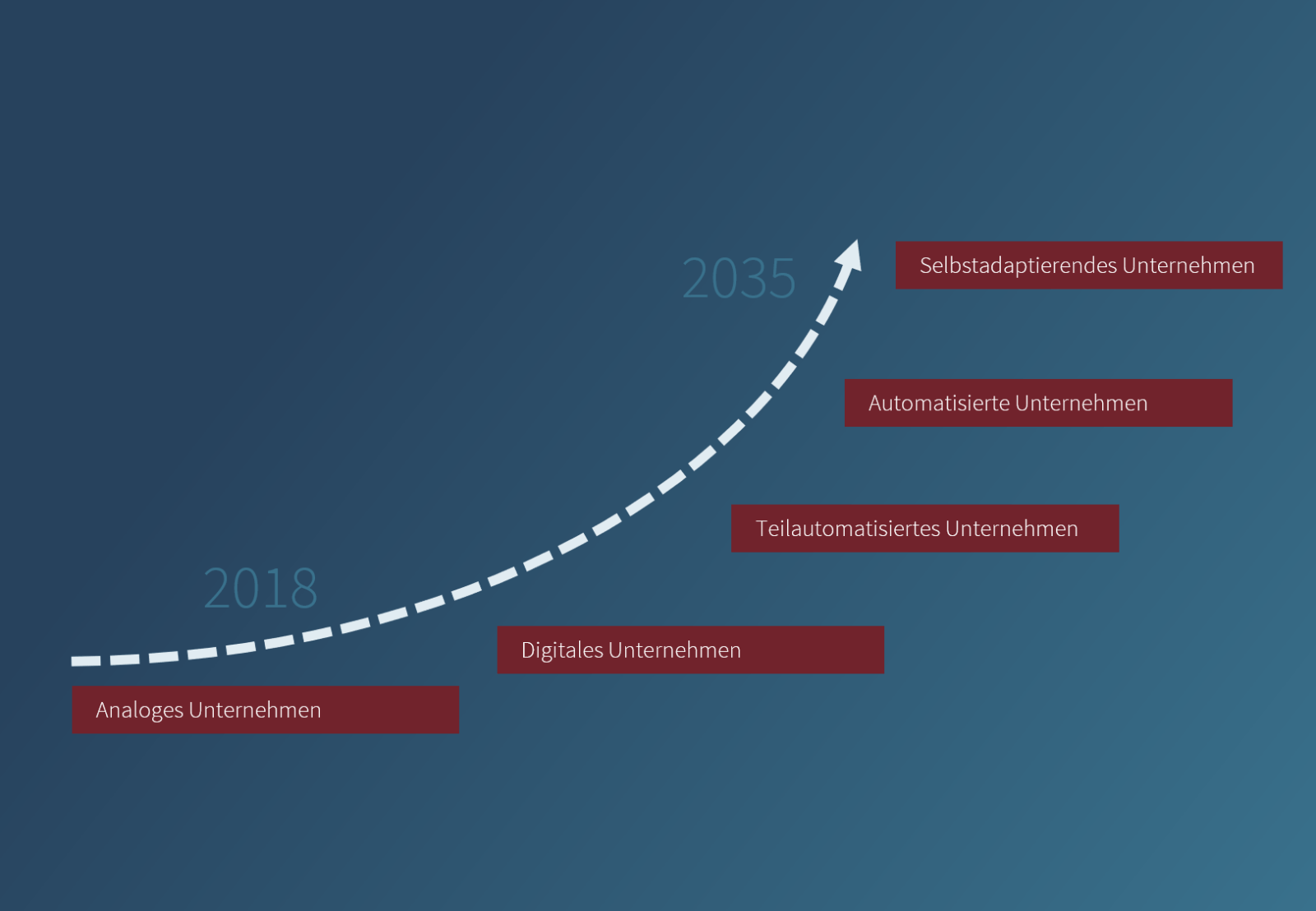The self-adapting company
Insights» The self-adapting company
The growing complexity of our everyday lives requires the use of self-learning algorithms. With the worldwide networking of all devices and persons and the exponentially increasing amount of data, we reach the limit of what is humanly manageable. With artificial intelligence, we make this complexity manageable again, and we remain the decision-makers.
The trigger for this trend is the rapid development of our computer systems and our software algorithms. This enables the increasingly independent control of business divisions. In the past, the main tasks of our computer systems were the collection, storage and processing of our data. In the future, algorithms based on our data will make intelligent decisions and execute them independently. The tasks of human beings will focus on the specifications of the strategies, the development of creative solutions and the interpersonal interaction. Routine activities and repetitive tasks are carried out by mechatronic robot systems and intelligent software systems.
the future
The changeover of companies to self-adaptation is comparable to the development of self-driving vehicles. The technical maturity of the „self-driving“ company is distinguished by the autonomy levels (evolution level) which also serve as guidelines for autonomous vehicles.

Applied to the self-adapting company, the five levels of autonomy have the following meaning:
Digital company
Mechatronic robots, software and data evaluations are the fundamental basis for a digital company. The technical systems and algorithms assist in all business tasks. Furthermore, the decision-making authority lies with the human labour force. Integrated software systems evaluate company data across the board and propose recommendations for action.
Level 2
Partially automated business processing
Integrated software solutions take over the independent planning and intelligent execution of individual business tasks. These clearly defined individual tasks are monitored and controlled by human interaction. The entire company continues to be based on the collaboration of technology and human labor on Level 2.
Level 3
Automated business processing
For companies from this level onwards, software solutions take over the business execution. The software makes learnable business decisions and executes them in most cases according to the specifications and the strategy. Unexpected exceptions and complex decisions or tasks continue to run manually. The human worker is controlled by software solutions and supports the automatic execution of business. The management, planning and control of the company remains a manual process.
Level 4
Self-adapting company
A self-adapting company is a highly automated, self-controlling and executing company in all its existing business areas. Only rare exceptions need to be done manually. Human interaction is automatically planned for empathetic, creative and strategic activities. The business success is achieved through fully automated processes. The company responds intelligently to changing market environments and adapts independently to the changed environments within the framework of the strategic guidelines. People are automatically recruited and with the help of democratic voting processes, the fit with corporate culture is ensured. Partner companies are automated and commissioned according to predicted requirements and the added value is carried out by software-controlled autonomous processes.
The management and shareholders of the company configure strategic guidelines and guiding principles and decide on the basis of simulations of the future business whether the strategic specifications are reasonable and feasible.
ReqPOOL and Catalysts continue to take the company to the next evolutionary level using learning algorithms and artificial intelligence. This includes strategic divisions, the business model, interaction with the customer and the value-adding processes and production. Thanks to artificial intelligence, it is possible to take the continuous improvement process to a new level. Processes, results and working models are optimized by the novel algorithms during ongoing operation.
AI-BAUANLEITUNG – An Artificial Intelligence Best-Practice Collection incl. Procedure model
From our many years of experience in consulting with large corporations, public organizations and medium-sized companies, we have brought together best practices for the use and use of artificial intelligence algorithms. With the help of this best-practice catalogue, the problems developed in the Design Thinking Workshops are optimally solved with the AI-BAUKASTEN. Decision makers decide which solutions best suit their business and choose from 200 different best practices and algorithms that have already been applied and tested.
Our approach
Benchmarking & Survey IST Architecture
In this phase, we review the company processes and determine the level of autonomy at which your processes and the entire company are located. By comparing them with your internal targets and external benchmarks, areas to be looked at in more detail are identified and potentials identified.
Strategizing
Strategy development is carried out by means of design thinking workshops together with the decision-makers. Together with you, we determine the challenges and the greatest optimization potentials of your company. The design thinking method aims to ensure that the problems are clearly defined and that suitable problem solutions can be implemented as prototypes. This quickly provides feedback from the market, organization and employees.
Definition of goals and speed
The project proposals developed in the strategy workshops are elaborated in project newsletters and prepared for the transformation phase. You will receive a validated business case invoice and a make-or-buy recommendation for each project. You determine the speed of the tranformation.
Iterative transformation phase: „building block on block“
> Analysis
Learning algorithms need data to improve in the learning process. This data must be identified, validated and processed in order to automatically integrate it into the learning process. Our experienced consultants analyze the existing data and prepare you for the algorithms. In addition, we implement the processes to permanently give learning algorithms the input they need.
> Prototyping implementation
It is only through the implementation of the first prototypes (Minimum Viable Product – MVP) that these concepts become visible for the first time and become real applicable for the company. Only a few weeks pass before this stage and within a few days the first vulnerable result is available. You don’t believe us? Then test us!
> Integration into the company’s business process
The learning processes and improvement algorithms are now embedded in the overall organization, so that the algorithms unfold their ideal effect in the daily process. This process is accompanied by appropriate change management to take the employees in the organization with them in this change. Experience shows that self-learning organizations produce higher outputs, improve product quality, and significantly increase employee and customer satisfaction.
Value
With the shift to self-adapting companies, our values for the way we do business and the business organizations will also change. Unique selling points of human nature will once again become more of a focus. In addition to the quality of the service, we will also evaluate the type of service.
Emotionality and creativity in interacting with us as human beings becomes more important to us. In general, human interaction will gain in value and move from the cost side to the profit side of our company metrics.

Insights» The self-adapting company
See more technical articles
Christian Buchegger
Deutschland: +49 (0) 30 84415801
Österreich: +43 (0) 800 500122
E-Mail: office@reqpool.com
KONTAKTIEREN SIE UNS
Vereinbaren Sie ein unverbindliches Erstgespräch mit unserem Ansprechpartner

Christian Buchegger
Deutschland: +49 (0) 30 29 877 628
Österreich: +43 (0) 800-500-122
E-Mail:office@reqpool.com

